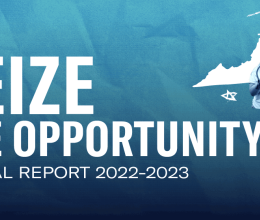
ACLU of Virginia has used similar legal arguments to successfully defend religious expression in parks and other public places
Richmond, VA--In response to requests from media and government officials the ACLU of Virginia has issued a statement reacting to a legal opinion from Attorney General Ken Cuccinelli on religious displays in public places.
Cuccinelli's opinion, published last Friday, responds to a request from Delegate Robert G. Marshall, who asked whether or not it was permissible for Loudoun County to allow religious displays "honoring the birth of Jesus Christ" in a public forum located in front of the county courthouse in Leesburg. (See ACLU letter to Loudoun County Board of Supervisors.)
Referring to the rights of private citizens using public property, Cuccinelli writes that "where the County already has provided a public forum or limited public forum, it will usually lack the right to exclude a religious display of reasonable duration based solely upon content."
Addressing the question of when the government itself can sponsor religious displays, Cuccinelli writes that "the County is free to communicate its own recognition of holidays, including Christmas, as long as overtly Christian symbols are balanced with other religious and secular ones in a way that communicates to reasonable, informed observers that the County is not making a religious statement."
Responding to the Cuccinelli opinion, ACLU of Virginia executive director Kent Willis issued the following statement:
Attorney General Cuccinelli is basically correct when he says that citizens have a right to use public forums for religious expression. In a public forum, all viewpoints are equally welcome whether they are political, social or religious. While the attorney general primarily addresses the question of Christian messages in public forums, it is important to remember that all faiths have the same right to use public forums to express their religious convictions.
The legal issues concerning expressions of faith in public places are well established, but they are still often misunderstood. Many public officials, especially those in local governments, believe that allowing religious expression by private parties on public property violates separation of church and state. That's incorrect. Prohibiting religious expression while allowing other kinds of expression discriminates against religion.
The ACLU of Virginia has dealt with these issues for years. When Fairfax County refused to allow Rita Warren to place a crèche in a public forum in front of the county courthouse, we went to court and prevailed. We also threatened to file a lawsuit against Stafford County park officials after they refused to allow a park to be used for baptisms. That matter was successfully resolved without going to court.
In his opinion, the attorney general also addresses the more nebulous legal issues that arise when the government itself puts displays on public property that include religious symbols. The Supreme Court has ruled that the government may not erect displays that are overtly religious, but that it can erect displays that incorporate religious expression into a primarily secular context. Thus, it is impermissible for the government to place a lone crèche in front of a courthouse, yet permissible for the same crèche to be put in the same place if it is surrounded by a menorah, a Santa Claus and several reindeer. In the end, it all depends on whether a person viewing the scene would interpret it as religious or secular.
We advise local governments planning to celebrate holidays that may be associated with a particular religion to proceed with caution and to seek the advice of an attorney skilled in First Amendment law. The best way to protect religious freedom is to keep the government neutral as regards religion, neither promoting nor inhibiting expressions of faith. Anytime the government decides to create its own displays containing religious expression, it runs the risk of unconstitutionally endorsing religion.
Cuccinelli's advisory opinion can be found at http://www.oag.state.va.us/OPINIONS/2010opns/10-067-Marshall.pdf.
Contact: Kent Willis, Executive Director 804-644-8022



